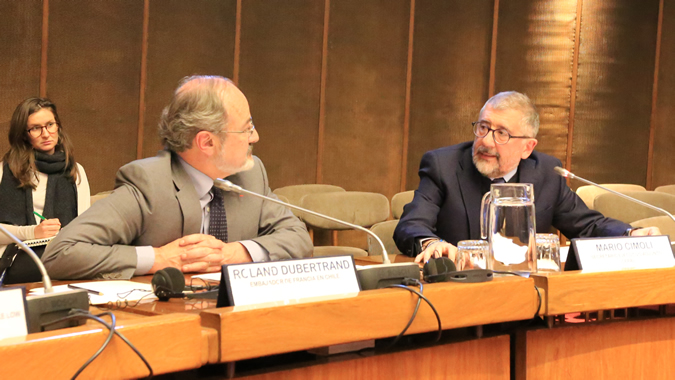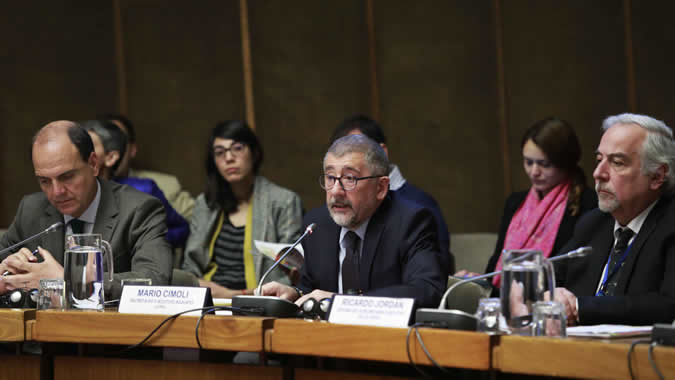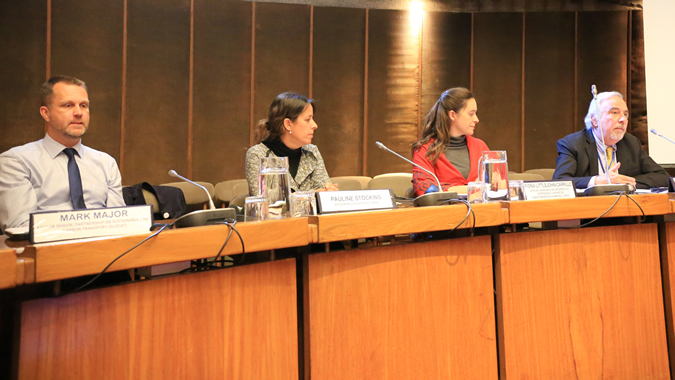The City is an Opportunity for Structural Change with Equality and an Economic Policy Instrument for Countries
Work area(s)
The Second Cities Conference concluded with a call to strengthen public-private dialogue for urban sustainability in Latin America and the Caribbean.

The city is an opportunity for structural change with equality, an instrument for development and an igniter of growth that public policy must harness, according to the authorities and experts gathered at the Second Cities Conference, which concluded today at the central headquarters of the Economic Commission for Latin America and the Caribbean (ECLAC) in Santiago, Chile.
The meeting – co-organized by ECLAC, the Assembly of Ministers and High Authorities on Housing and Urban Development of Latin America and the Caribbean (MINURVI) and UN-Habitat – brought together authorities from national and local governments in the region, representatives of international organizations and United Nations agencies, non-governmental organizations and members of civil society.
In his closing remarks, Mario Cimoli, ECLAC’s Deputy Executive Secretary, sustained that multilateralism is key to achieving sustainable urban development, noting that “there is no solution for a city that acts alone in this world, whether on matters of mobility, access or sustainability.”
“We are not going to resolve the issue of sustainability by addressing cities individually, we will resolve it when it is a matter of networks, multilateral debate and a joint agenda. The city has to be the object of public policy where countries, in cooperation with other countries, intervene to achieve access, improved mobility and better policy,” he stated.
The senior official from ECLAC stressed the importance of addressing city-related issues in an interdisciplinary way so they may form part of public policies from other areas of government.
In addition, he urged that cities be viewed as an instrument of economic policy and emphasized that public-private dialogue is a critical vehicle for attaining sustainable cities.
Cimoli indicated that, for ECLAC, the issue of cities “goes beyond the definition, of the urban place where we move around, where we live and have our lives. The city is one of the critical elements for building public policy.”
The Second Cities Conference concluded with a public-private dialogue for urban sustainability, organized by ECLAC and the government of France, which was inaugurated by the United Nations regional commission’s Deputy Executive Secretary and the Ambassador of France in Chile, Roland Dubertrand.
During his remarks, Mario Cimoli held that in Latin America and the Caribbean, sustainable urban transport poses specific problems of coordination and direction between the public and private spheres, between civil society and other stakeholders, and between national and local arenas.
“It is clear that multi-stakeholder coordination plays a central role in the sustainability of our cities and of our region. It is with this aim that ECLAC is opening more spaces for multi-stakeholder dialogue, including national and subnational governments, civil society and the private sector,” he stated.
Ambassador Dubertrand, meanwhile, contended that the case of urban mobility represents the best illustration of the need for public-private cooperation.
“One cannot resolve the challenges of mobility, reduce dependence on cars, and adjust regulatory frameworks without coordinated action on the part of the public and private sectors. Building a sustainable city is a challenge that requires collective action, a successful collaboration between public and private stakeholders,” he indicated.
The diplomat added that, for France, the building of more sustainable cities materializes the fight against climate change, and he lauded the Cities Conference as “an excellent opportunity to consolidate efforts and leverage actions in support of our shared priorities.”
The closing session also included a segment on the empowerment of women in transport in Latin America and the Caribbean, and another addressing the link between urban health and well-being and safe, affordable and sustainable urban mobility.
Related event
Second Cities Conference: Towards Safe, Affordable and Sustainable Urban Mobility in Latin America and the Caribbean
The Cities Conference II will be held at ECLAC’s headquarters in Santiago, Chile during the 16-19 of October 2018.
Related content

Achieving Sustainable Mobility Systems Essential for Combating Climate Change and Attaining Inclusive Urban Development
Second Cities Conference: Towards Safe, Affordable and Sustainable Mobility in Latin America and the Caribbean, inaugurated today at ECLAC headquarters in Santiago, Chile.

Expertos destacan importancia de datos urbanos para el diseño y la gestión de políticas públicas informadas y efectivas
En el marco de la Segunda Conferencia de las Ciudades, autoridades de la región analizaron las herramientas de monitoreo y las fuentes de financiamiento para la movilidad urbana sostenible en América…
Related link(s)
Country(ies)
- Latin America and the Caribbean
Contact
Public Information Unit
- prensa@cepal.org
- (56 2) 2210 2040